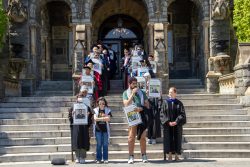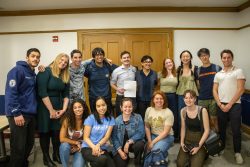This past weekend, 16 Georgetown students traveled to St. Louis, Mo. to participate in Ferguson October, a movement calling attention to police violence and racial injustice in the aftermath of the fatal shooting of Michael Brown. Organized by a variety of a Georgetown organizations, including the university chapter of the NAACP and the Center for Social Justice Research, Teaching, and Service, the students attended a rally in downtown St. Louis, a protest at the Ferguson Police Department, and a variety of teach-ins. The group also visited the site where unarmed black teenager Brown was killed by a police officer in August, setting off a chain of protests and calls for change over the last two months.
The “Weekend of Resistance,” arranged by a coalition of national and local justice organizations, aimed “to build momentum for a nationwide movement against police violence,” according to Ferguson October’s website. For the Georgetown students who attended, the weekend was an opportunity to show solidarity with other protesters, as well as to learn about community organization and the future of the movement.
“Unfortunately, Michael Brown’s incident is not an isolated one, and I realize that this is something … our generation, has had to fight—against systemic racism, against police brutality, against this militarization of the police, against the killing of unarmed, usually, people of color,” said Crystal Walker (SFS ‘16), who traveled to Ferguson. “The people in Ferguson are doing so much, and people from all across the country have come to do so much, and I wanted to show solidarity and show support.”
According to Walker, the rally on Saturday drew over 2,500 people who marched together and demonstrated the intersectional nature of the movement. “What was so beautiful was just the diversity of the people who were there,” she said. “There were older people there, there were younger people there, there were people of different genders, races, sexual orientations … It just showed that it’s not just black people who care about this issue, it’s all people who care about it.”
Ayodele Aruleba (COL ‘17) reflected on one of the chants from the protest that particularly resonated with him: “Tell me what democracy looks like. This is what democracy looks like.”
“Just having the opportunity for us to stand outside the Ferguson police department … To stand there and tell our views, tell them how we feel about the system, about the structure, to speak to police officers themselves, it just made me appreciate democracy,” he said.
At the police department protest, “[the police] had batons, they had shields, helmets, glasses, of course they had their guns,” Walker said, but were not interfering with the protesters. A woman from Ferguson who said she had been protesting every night since Brown’s death explained to Walker the unusual tone of the weekend.
“She [said], ‘Oh, they’re only doing that because they know people are here from out of town, they know that the media’s here … usually they’re out on the streets pushing us, they’re calling us names, they’re arresting us for no reason.’ Even a few hours after we left, people were getting arrested—Cornel West got arrested, clergymen got arrested, and that just kind of like showed me, wow, it was a show,” Walker said.
In “Back From Ferguson: A Conversation With Dave Ragland” on Monday night, the students joined Dr. David Ragland, Professor of Education at Bucknell University, to reflect on the weekend and share their experiences with the Georgetown community. The event followed “Don’t Shoot: A Vigil for Mike Brown,” and “Reflections on Ferguson,” a panel discussion of Georgetown professors, which were held in August, as well as the Ferguson Teach-In and Dinner in September.
“I think it’s important for us to see all of the issues that we encounter, all the kinds of structural violence, as unjust, but also as, at its root, a violation of human dignity,” Ragland said. He emphasized the importance of connections between movements, referring to issues of environmental degradation, sexual assault, and gentrification as examples of seemingly separate but structurally connected injustices.
Students also discussed ways to carry their experiences back to the Georgetown community and to continue raising awareness.
Sophomore Michael Martin (COL ‘17) described returning to his dorm after the trip and being shocked by students’ lack of awareness of the situation in Ferguson and its underlying issues. “It’s something that we need to bring to the table, and really talk about as a whole community, not just those who care about it,” he said. “So I think it’s kind of a challenge for all of us who are in this room to go out and talk about these issues that are controversial to those who may not even want to hear it.”
Photo by Patricia Cipollitti





